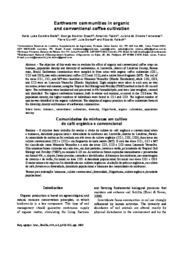Earthworm communities in organic and conventional coffee cultivation.
Earthworm communities in organic and conventional coffee cultivation.
Author(s): BARTZ, M. L. C.; BROWN, G. G.; PASINI, A.; FERNANDES, J. de O.; CURMI, P.; DORIOZ, J.; RALISCH, R.
Summary: The objective of this work was to evaluate the effect of organic and conventional coffee crops on biomass, population density and diversity of earthworms, in Lerroville, district of Londrina County, Paraná state, Brazil. Earthworm communities were sampled in three areas with organic coffee cultivation (CO1, CO2 and CO3), two with conventional coffee (CC1 and CC2), and a native forest fragment (MT). The soil of the areas CO1, CC1, and MT was classifi ed as Nitossolo Vermelho (Rhodic Kandiudox), while CO2, CO3, and CC2 were on Latossolo Vermelho (Rhodic Hapludox). Eight samples were taken in each area on two occasions, winter and summer, using the Tropical Soil Biology and Fertility (TSBF) method in the 0–20 cm soil layer. The earthworms were handsorted and preserved in 4% formaldehyde, and were later weighed, counted and identifi ed. The highest earthworm biomass, both in winter and summer, occurred in the CO3 area. For population density, the higher numbers of individuals were found in CO1 and CO3. The highest number of species was identifi ed in the organic cultivation. The adoption of organic practices in coffee cultivation favored the diversity, density and biomass of earthworm communities.
Publication year: 2009
Types of publication: Journal article
Unit: Embrapa Forestry
Keywords: Conventional cultivation, Cultivation, Diversity, Organic cultivation, biomass, density
Observation
Some of Embrapa's publications are published as ePub files. To read them, use or download one of the following free software options to your computer or mobile device. Android: Google Play Books; IOS: iBooks; Windows and Linux: Calibre.
Access other publications
Access the Agricultural Research Database (BDPA) to consult Embrapa's full library collection and records.
Visit Embrapa Bookstore to purchase books and other publications sold by Embrapa.

